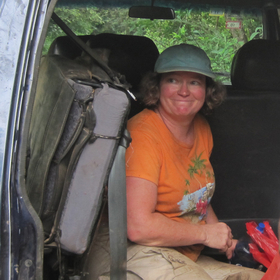

Jennifer
Powers
The Powers lab is interested in how land-use changes like secondary forest regeneration and climate change like increased frequency of drought affect seasonally dry tropical forest. We use a variety of tools including long-term observations, large-scale experiments, and meta-analysis and we collaborate with simulation modelers.
Research statement
I use experimental and observational approaches to investigate and biogeochemical and ecosystem processes across local, regional, and global scales. In particular, my research focuses on understanding:
- the patterns of carbon and nitrogen dynamics in forest ecosystems,
- the effects of anthropogenic environmental changes including land-cover change, global warming and nitrogen deposition on element cycling processes,
- the feedbacks among soil fertility, plant processes and microbial communities, and,
- how individual plant and microbial species influence element cycling processes.
My research interests are diverse, but they are linked by the common theme of understanding the relationships among ecological processes, the patterns they generate, and the effects of anthropogenic environmental changes across a range of spatial and temporal scales. I use a diverse set of tools including microbiological techniques, soil chemistry, stable isotope analysis, remote sensing, geostatistics, and geographic information systems (GIS) to extrapolate from fine to coarse spatial scales and to connect ecological processes to patterns. The bulk of my field work is in tropical ecosystems.
Selected publications
Smith-Martin,C.M., X. Xu, D. Medvigy, S.A. Schnitzer, J.S. Powers. Allometric scaling laws linking biomass and rooting depth vary across ontogeny and functional groups in tropical dry forest lianas and trees. In press. New Phytologist.
Smith-Martin, C.M., C.L. Bastos, O.R. López, J.S. Powers, and Stefan A. Schnitzer. 2019. Effects of dry season irrigation on leaf physiology, biomass, and belowground allocation in tropical trees and lianas. Ecology doi.org/10.1002/ecy.2827
Hulshof, C.M. and J.S. Powers. Tropical forest composition and function across space and time: Insights from diverse gradients in Area de Conservación Guanacaste. In press, Biotropica.
Medvigy, D., G. Wang, Q. Zhu, W. J. Riley, A. M. Trierweiler, B. G. Waring, X. Xu, and J. S. Powers. 2019. Observed variation in soil properties can drive large variation in modeled forest functioning and composition during tropical forest secondary succession. New Phytologist 223: 1820-1833
Waring, B.G., D. Peréz-Aviles, J. Murray and J.S. Powers. 2019. Plant community responses to stand-level nutrient fertilization in a secondary tropical dry forest. Ecology 100, e02691
Waring, B.G., J.M. Becknell, and J.S. Powers. Nitrogen, phosphorus, and cation use efficiency in stands of regenerating tropical dry forest. 2015. Oecologia doi: 10.1007/s00442-015-3283-9.
Locatelli, B., C. Catterall, P. Imbach, C. Kumar, R. Lasco, E. Marín-Spiotta, B. Mercer, J.S. Powers, N. Schwartz, and M. Uriarte. Tropical reforestation and climate change: beyond carbon. 2015. Restoration Ecology doi:10.1111/rec.12209.
Vargas G., G., L.K. Werden, and J.S. Powers. Explaining legume success in tropical dry forests based on seed germination niches: a new hypothesis. 2015. Biotropica doi: 10.1111/btp.12210.
Gei, M.G., and J.S. Powers. 2015. The influence of seasonality and species effects on surface fine roots and nodulation in tropical legume tree plantations. Plant and Soil 388:187-196.
Álvarez-Cansino L., S.A. Schnitzer, J.P. Reid, and J.S. Powersand. 2015. Liana competition with tropical trees varies with seasonal rainfall and soil moisture but not tree species identity. Ecology 96:39-45.
Ceccon, E., I. Sánchez, and J.S. Powers. 2014. Biological potential of four indigenous tree species from seasonally dry tropical forest for soil restoration. Agroforestry Systems. DOI 10.1007/s10457-014-9782-6.
Becklund, K.K., L.L. Kinkel, and J.S. Powers. 2014. Landscape variation in the abundance and activity of pathogen-suppressive Streptomyces in secondary tropical dry forests of Costa Rica. Biotropica 46: 657-666. (Editor’s Choice, Biotropica).
Becknell, J.M., and J.S. Powers. 2014. Aboveground biomass, plant functional traits, and edaphic variation in secondary tropical dry forests. Canadian Journal of Forest Research 44: 603-614. (Editor’s Choice, CJFR).
Powers, J.S., and D. Peréz-Aviles. Edaphic factors are a more important control on fine root stocks than stand age in tropical dry forests regenerating following agricultural land use.2013. Biotropica. 45: 1-9. DOI: 10.1111/j.1744-7429.2012.00881.x.
Powers, J.S. and S. Salute. Contrasting effects of macro- and micronutrients additions on short-term litter decomposition rates of two tropical dry forest tree species. 2011. Plant and Soil 346: 245–257.
Powers, J.S., M.D. Corre, T.E. Twine, and E. Veldkamp. 2011. Geographic bias of field observations of soil carbon stocks with tropical land-use changes precludes spatial extrapolation. Proceedings of the National Academy of Sciences.
Powers, J.S., and P.L. Tiffin. 2010. Plant functional type classifications in tropical dry forests in Costa Rica: leaf habit versus taxonomic approaches. Functional Ecology 24:927-936.
Kissing, L.B., and J.S. Powers. 2010. Coarse woody debris stocks as a function of forest type and stand age in Costa Rican tropical dry forest: long-lasting legacies of previous land use. Journal of Tropical Ecology 26:467–471.
Powers, J.S., J.M. Becknell, J. Irving, and D. Perez-Aviles. 2009. Diversity and structure of regenerating tropical dry forests in Costa Rica: environmental drivers and geographic patterns. In press. Forest Ecology and Management.
Powers, J.S., R.A. Montgomery, E.C. Adair, F.Q. Brearley, S.J. DeWalt, C.T. Castanho, J. Chave, E. Deinert, J.U. Ganzhorn, M.E. Gilbert, J. Antonio-Gonzalez, S. Bunyavejchewin, H.R. Grau, K.E. Harms, A. Hiremath, S. Iriarte-Vivar, E. Manzane, A.A. de Oliveira, L. Poorter, J.B. Ramanamanjato, C. Salk, A.Varela, G.D. Weiblen and M.T. Lerdau. Decomposition in tropical forests: a pan-tropical study of the effects of litter type, litter placement and mesofaunal exclusion across a precipitation gradient. 2009. Journal of Ecology 97: 801-811.
Powers, J.S., and E. Veldkamp. 2005. Regional variation in soil carbon and delta13C in paired forests and pasture of Northeastern Costa Rica. Biogeochemistry 72: 315-336.
Powers, J.S. 2004. Soil carbon and nitrogen storage following contrasting land-use transitions in Northeastern Costa Rica. Ecosystems 7: 134-146.
Powers, J.S. 2004. New perspectives in comparative ecology of Neotropical rain forests: Reflections on past, present and future. Biotropica 36: 2-6.
Education
Ph.D., Duke University, 2001